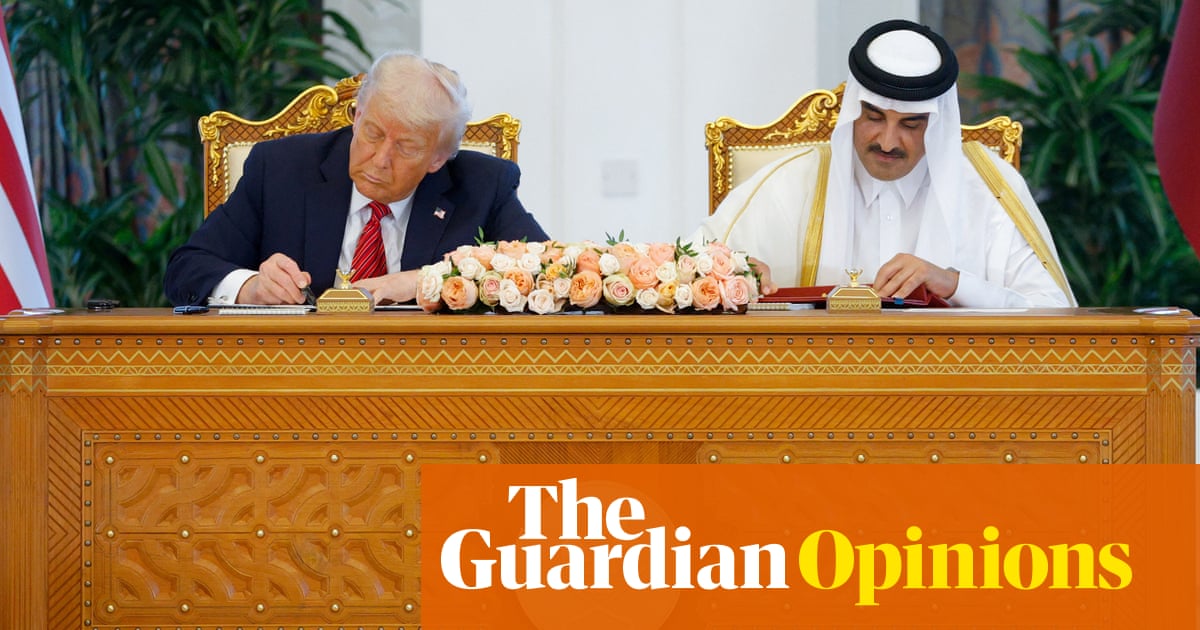It certainly looks as if policy is for sale in the Trump administration. After all, the president’s primary domestic policy deputy, Elon Musk, gained his position in the administration more or less by purchasing it: he is the richest man in the world, and the primary funder of Trump’s last presidential campaign, and it is seemingly by this virtue – does he have any others? – that Musk has been granted the authority to dismantle large swaths of the federal bureaucracy.
This is something of a pattern for Donald Trump. In his first term, it became de rigueur for foreign dignitaries tostay at Trump’s hotelon trips to Washington, a practice long perceived to be a way of currying favor with the president by spending money at his businesses. Trump funneled money to his hotel business from domestic sources, too: when Secret Service agents were required to stay at Trump’s hotels, they werecharged exorbitant rates– including after he left office. Before their recent worldwide jaunt making deals with foreign governments and businesses that willfinancially benefit their father– including plans for a major new golf course in Qatar, built in partnership with a company controlled by the royal family – Trump’s sons launched$Trump, a cryptocurrency coin – that ever-popular scheme of shameless millennial grifters.
Foreign powers, major businesses and wealthy individuals whose interests might be affected by Trump administration policy have all rushed to invest, a not-so-subtle way of ingratiating themselves to the president with money. Last month, Trump announced that the biggest investors in the scheme could meet with him personally, either at one of his clubs or at the White House: a literal auction of access to the president. His ear is for sale to the highest bidder.
This kind of behavior from the Trump administration has gone on for so long that it is hard to rouse the media to attention to cover it. Their standards for the ethical conduct of politicians – or, at least, of Republicans – have lowered so dramatically that it’s hard to tell if they have any. Personal enrichment by politicians is no longer treated as a scandal, a state of affairs that’s been helped along not only by how pervasive corruption has become, but by the US supreme court’s repeated and dramatic efforts to narrow federal anti-bribery statutes and the longstanding non-enforcement of the constitution’s emoluments clause.
Amid this non-response to influence peddling and back-scratching more broadly, it is sometimes difficult to get Americans to notice just how flagrantly their president is on the take. If Trump has been selling access and influence for years – if he has not divested from his companies, which are now supposedly run by his sons, and continues to profit from the largesse of billionaires foreign and domestic, is it really a story that he still does so now?
And so it is a testament to the brazenness and almost cartoonish excess, of Trump’s dealings that one of them has gained so much coverage: his willingness to accept a$400m luxury 747 plane, decked out so lavishly that it has been called a “palace in the sky”, from the royal family of Qatar.
The plane, Trump says, is a gift. “It’s a great gesture from Qatar. I appreciate it very much. I would never be one to turn down that kind of an offer,” he told reporters. Trump has long bemoaned what he considers the inadequate state of the two aircraft that currently serve as Air Force One; he has been angling for a fancier plane since his first term. As that has been slow to materialize, the Qataris appear to have stepped in with an alternative: they will give Trump a “palace in the sky” to serve as Air Force One, and the plane would then be transferred, after he leaves office, to his presidential library.
The mainstream media has been reluctant to name this exchange as a bribe. After all, Trump insists that the aircraft is being gifted to him, in exchange for nothing. “The Defense Department is getting a GIFT, FREE OF CHARGE,” he wrote on social media. Responding to suggestions that he pay for the plane to avoid the appearance of impropriety, he countered, “Anybody can do that! The Dems are World Class Losers!!!”
Later, in an interview with the New York Times’ Maggie Haberman, Trump elaborated further: “I mean, I could be a stupid person say, ‘No, we don’t want a free, very expensive airplane.’ But it was – I thought it was a great gesture.” He went on to explain that he does indeed believe that the “gift” of the airplane is a recognition of his own stance toward Qatar, which has changed dramatically since he called the nation a sponsor of terror and endorsed a regional blockade during his first term. “I think it was a gesture because of the fact that we help,” he said of Qatar. “If it wasn’t for us, they probably wouldn’t exist right now.”
What is remarkable about the plane episode is not just Trump’s willingness to accept a lavish gift from another state, but the impotence and indifference of Congress and the judiciary to punish him for it.
To accept a gift from a foreign government is a plain violation of the unambiguous text of the constitution. That the US supreme court has made federal anti-bribery laws nearly impossible to prosecute has made a legal response to this kind of behavior even harder. That Congress – controlled by a Republican majority more interested in benefiting from Trump’s largesse than in checking his excesses or asserting their own constitutional prerogatives – is both unable and unwilling to stop him does not change it either. Trump will get away with his plane stunt: we know he will, because the constitutional checks on his power have been made deliberately useless. But no one should be confused about what he is doing.
Moira Donegan is a Guardian US columnist
